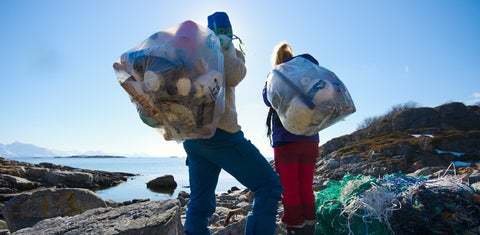
Canadian drivers, barriers and policy recommendations to address plastic pollution in the Great Lakes
By: Nancy Goucher, Water Institute, University of Waterloo
Under the Microplastics Project one of our students, Trang Le, successfully defended her Master’s thesis in December 2022. Her research explores current challenges and best practices for addressing plastic pollution in the Great Lakes and includes recommendations to help Canada reduce plastic pollution while advancing a circular economy. To inform these recommendations, Trang interviewed 21 representatives from the private sector, public sector, non-profit organizations or NGOs, and academia who are involved in plastic pollution and prevention in Canada and specifically the Great Lakes, such as the Great Lakes Plastics Cleanup Initiative, a joint initiative of Pollution Probe and the Council of the Great Lakes Region.
An in-depth review of interview transcripts revealed areas of agreement as well as conflicting perspectives. Trang was able to capture and summarize the current state of thinking of those she interviewed despite the diversity and complexity of their responses. For example, most interviewees preferred preventive measures over value recovery or plastic garbage cleanups. This means that rather than depending on recycling (which has a very poor success rate) or cleaning up plastic after it has already been disseminated into the environment, most believe we should be searching for strategies to prevent or minimize our consumption of plastic in the first place.
The respondents also acknowledged that a comprehensive set of strategies to plastic pollution is required because there are several sources of plastic pollution that require specialized and multi-level targeted remedies. Plastic enters the environment not just as a result of individual consumer activity, but also via non-traditional sources such as plastic pellet spills, microfibers from clothing, construction materials, the wastewater management system, abandoned fishing gear, and so on.
Findings revealed plastic pollution is difficult to address because of several barriers that exist, including the lack of:
- Enforceable policies at the provincial, national and binational levels;
- Concrete action from key players across sectors including the private sector, government and average consumers; and
- Capacity to take action, such as limited alternatives to using single-use plastics.
The good news is that there is no shortage of ideas for how governments can be improving their approach to plastic pollution, and there are success stories that offer inspiration. Ontario’s bill 228, for instance, was passed in 2021 to keep polystyrene out of Ontario's lakes and rivers. Interviewees commonly pointed to the use of economic or price-based instruments, and mandated, enforceable rules as promising paths forward. Many also agreed that we need to do more to educate and raise awareness of the issue, especially among children and consumers. They also highlighted the importance of stronger collaboration among the various actors and sectors that are involved.
Other practical solutions that were identified encompass:
- Phasing out the use of unnecessary products such as styrofoam food packaging, microfibers, single-use food wrappers, and plastic water bottles.
- Harmonizing plastic waste and pollution policy frameworks in Canada.
- Establishing industry standards that 1) prevent the leakage of plastic pellets and fragments; and 2) encourage the re-design of plastic products to increase their recyclability.
- Creating incentives to encourage responsible practices within the private sector such as subsidizing the development of alternatives to using virgin plastic, funding innovative research and promoting extended producer responsibility.
- Considering financial instruments such as deposit-refund schemes for single-use plastic items.
- Furthering research on the impact of using toxic additives and fillers in plastic products.
If you would like to learn more about Trang’s research, see UW’s institutional repository (here) or contact her supervisor Roy Brouwer.
Photo: Cleaning up our coastline by Bo Eide on Flickr